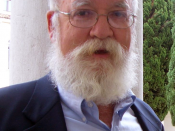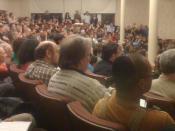David Chalmers and Daniel Dennett are both atheists and philosophers (1)(2). However, this is pretty much where the similarities end. David Chalmers is an Australian philosopher and self-proclaimed 'dualist' (3) who firmly believes that "the heart of the science of consciousness is trying to understand the first person perspective" (4). He rejects more materialistic views which he sees as reductionist and argues that when the third person perspective is taken we overlook the important sensations, thoughts and feelings of what it's like to be human. Daniel Dennett on the other hand insists the first person approach can not be trusted (5) and prefers to study consciousness objectively from the third person. He is an American who embraces the materialist approach and rejects dualism (6). This essay will look in more depth at each individual's position as a theorist of consciousness and attempt to understand their contrasting viewpoints.
When trying to understand and explain consciousness, philosophers must realise that there is no agreed definition of what 'consciousness' actually is, which naturally creates a problem.
There are those for example who would argue that self-awareness is simply an illusion (7) and because this is based entirely on one's own subjective experience it would be difficult to argue or convince them otherwise. As Susan Blackmore puts it, "no wonder philosophers and scientists have struggled for millennia with the concept" (8) The French philosopher René Descartes proposed that the body works like a machine and is constricted to the laws of physics whereas the mind is a separate 'non-material' entity (10), he believed the body and mind to be connected at the pineal gland in the brain, which he referred to as "the seat of the soul" (10). However he does not explain how the pineal gland can interact with the mind.


